De Ierse dichter Michael Longley werd geboren op 27 juli 1939 in Belfast. Zie ook alle tags voor Michael Longley op dit blog.
The Ice-Cream Man
Rum and raisin, vanilla, butter-scotch, walnut, peach:
You would rhyme off the flavours. That was before
They murdered the ice-cream man on the Lisburn Road
And you bought carnations to lay outside his shop.
I named for you all the wild flowers of the Burren
I had seen in one day: thyme, valerian, loosestrife,
Meadowsweet, tway blade, crowfoot, ling, angelica,
Herb robert, marjoram, cow parsley, sundew, vetch,
Mountain avens, wood sage, ragged robin, stitchwort,
Yarrow, ladys bedstraw, bindweed, bog pimpernel.
Eurycleia
I
Eurycleia fetched a basin, poured cold water into it,
Added hot water, and got ready to wash his feet.
But Odysseus shifted out of the firelight, afraid
She might notice his scar, the key to his identity,
A wound a boar inflicted years back, a flesh-wound.
His wet-nurse cradled his foot in her hands and touched
The scar, and recognising him she let go of his leg
Which clattered into the basin water everywhere,
Such pain and happiness, her eyes filling with tears,
Her old voice cracking as she stroked his beard and whispered
You are my baby boy for sure and I didnt know you
Until I had fondled my masters body all over.
II
I began like Odysseus by loving the wrong woman
Who has disappeared among the skyscrapers of New York
After wandering for thousands of years from Ithaca.
She alone remembers the coppice, dense and overgrown,
Where in a compost of dead leaves the boar conceals
Its bristling spine and fire-red eyes and white tusks
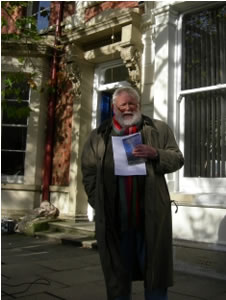
De Duitse schrijfster, dichteres en vertaalster Hilde Domin werd geboren in Keulen als Hilde Löwenstein op 27 juli 1909. Zie ook alle tags voor Hilde Domin op dit blog.
Lied zur Ermutigung III
für Li
Diese Vögel
ohne Schmerzen,
diese leichtesten goldenen
Vögel
dahintreibend
über den Dächern.
Keiner
nach dem andern
fragend.
Ohne Bitte,
ohne Sehnsucht,
sich mischend, sich trennend.
Wir,
unter den Dächern,
uns anklammernd.
Sieh,
die Sonne kehrt
wieder
als goldener Rauch.
Die fallende steigt.
Steigt aus den Dächern Hiobs.
Es tagt
heute
zum zweiten Mal.
Wo steht unser Mandelbaum
Ich liege
in deinen Armen, Liebster,
wie der Mandelkern in der Mandel.
Sag mir: wo steht
unser Mandelbaum?
Ich liege in deinen Armen
wie in einem Schiff,
ohne Route noch Hafen,
aber mit Delphinen am Bug.
Unter unserem Rücken
ein Band von Betten
unsere Betten in den vielen Ländern,
im Nirgendwo der Nacht,
wenn rings ein fremdes Zimmer versinkt.
Wohin wir kamen
– wohin wir kommen, Liebster,
alles ist anders,
alles ist gleich.
Überall wird das Heu
auf andere Weise geschichtet
zum Trocknen
unter der gleichen
Sonne.
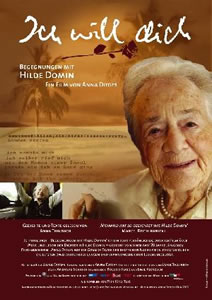
Hilde Domin (27 juli 1909 – 22 februari 2006)
Filmaffiche
De Amerikaanse schrijver Theodore Herman Albert Dreiser werd geboren op 27 juli 1871 in Sullivan, Indiana. Zie ook alle tags voor Theodore Dreiser op dit blog en ook mijn blog van 27 juli 2010.
Uit: An American Tragedy
„Dusk–of a summer night.
And the tall walls of the commercial heart of an American city of perhaps 400,000 inhabitants–such walls as in time may linger as a mere fable.
And up the broad street, now comparatively hushed, a little band of six,–a man of about fifty, short, stout, with bushy hair protruding from under a round black felt hat, a most unimportant- looking person, who carried a small portable organ such as is customarily used by street preachers and singers.And with him a woman perhaps five years his junior, taller, not so broad, but solid of frame and vigorous, very plain in face and dress, and yet not homely, leading with one hand a small boy of seven and in the other carrying a Bible and several hymn books.With these three, but walking independently behind, was a girl of fifteen, a boy of twelve and another girl of nine, all following obediently, but not too enthusiastically, in the wake of the others.
It was hot, yet with a sweet languor about it all.
Crossing at right angles the great thoroughfare on which they walked, was a second canyon-like way, threaded by throngs and vehicles and various lines of cars which clanged their bells and made such progress as they might amid swiftly moving streams of traffic.Yet the little group seemed unconscious of anything save a set purpose to make its way between the contending lines of traffic and pedestrians which flowed by them.
Having reached an intersection this side of the second principal thoroughfare–really just an alley between two tall structures—now quite bare of life of any kind, the man put down the organ, which the woman immediately opened, setting up a music rack upon which she placed a wide flat hymn book.Then handing the Bible to the man, she fell back in line with him, while the twelve-year-old boy put down a small camp-stool in front of the organ.“
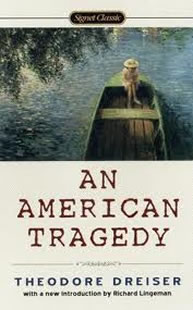
Cover
De Nederlandse schrijfster en psychologe Marijke Höweler werd geboren in Koog aan de Zaan op 27 juli 1938. Zie ook alle tags voor Marijke Höweler op dit blog.
Uit: Het Huis
“Het kind ging mee. De hond begon meteen te blaffen. Ik zei dat ie niets deed, hoewel ik hem de laatste tijd heel slecht vertrouwde.
Ze zeiden dat ik het heel mooi had verbouwd. We gingen aan de tafel zitten. Ik schonk een glas. Het kind lustte geen melk. Maar ik had niet anders.
De balken vonden ze ook heel mooi, die waren zeker oud? Ik zei maar niet dat het schijnlogs waren die ik zelf had opgehangen. Maar toch, terwijl zij daar mijn werk zo zaten te bekijken, moest ik almaar denken aan mijn vrouw, die ze niet had kunnen zien. Omdat ik ermee bezig was voor als zij uit het ziekenhuis zou komen. Daarom heb ik de houten overkap voor de gordijnen nooit afgemaakt. Dat zag ik eigenlijk voor het eerst nu zij er zo naar keken.
Ze leken op te willen staan. Ik zei ze dat mijn vrouw was weggehaald. Ze vroegen of het lang geleden was. Twee jaar en zeven maanden. En gisteren zou ze jarig zijn geweest. Ze vonden het wel erg. Het kind zat me nieuwsgierig aan te kijken. Nadat ik ze uitgelegd had waar mijn vrouw aan was gestorven, liet ik ze de keuken zien, de was- en strijkkamer, de bloemenkas, die leeg was en waar ik nooit meer kwam. Ik snapte eigenlijk meteen dat de salon hun smaak niet was. Ze hielden meer van wat ik liever armoe noem. Ik ging zoeken of ik nog koek of snoep had voor het kind. Dat was zo en het zei: ‘Dank u wel.’ ‘Meneer,’ zei Laisa, maar dat hoefde niet van mij. Ik vind het genoeg als kinderen je bedanken.”
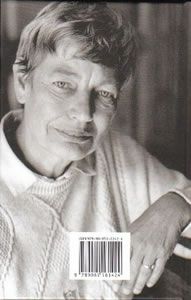
Marijke Höweler (27 juli 1938 – 5 mei 2006)
De Franse schrijver Julien Gracq werd geboren op 27 juli 1910 als Louis Poirier in Saint-Florent-le-Vieil bij Angers. Zie ook alle tags voor Julien Gracq op dit blog en ook mijn blog van 27 juli 2010.
Uit: Le sens de la forêt
„Ce fut vers la fin de décembre que la première neige tomba sur l’Ardenne. Quand Grange se réveilla, un jour blanc et sans âge qui suintait de la terre cotonnait sur le plafond l’ombre des croisées ; mais sa première impression fut moins celle de l’éclairage insolite que d’un suspens anormal du temps : il crut d’abord que son réveil s’était arrêté ; la chambre, la maison entière semblaient planer sur une longue glissade de silence – un silence douillet et sapide de cloître, qui ne s’arrêtait plus Il se leva, vit par la fenêtre la forêt blanche à perte de vue, et se recoucha dans la chambre quiète avec un contentement qui lui faisait cligner les yeux. Le silence respirait autour de lui plus subtil sous cette lumière luxueuse. Le temps faisait halte : pour les habitants du Toit, cette neige un peu fée qui allait fermer les routes ouvrait le temps des grandes vacances. (p.104)
Ils fumèrent un moment en silence. Il faisait bon. La nuée se dissipait; un ou deux coups de tonnerre roulèrent faiblement derrière l’horizon de la Belgique, avec le grondement pacifié d’une queue d’orage. La lune s’était dégagée : au fond de la trouée des arbres, la pente de la clairière se givrait d’une lumière froide, minérale, toute ocellée par l’ombre d’encre des jeunes sapins assis sur l’herbe.“
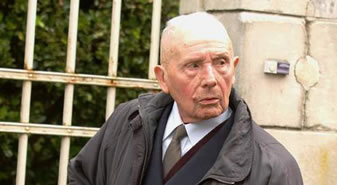
Zie voor nog meer schrijvers van de 27e juli ook mijn vorige blog van vandaag.
